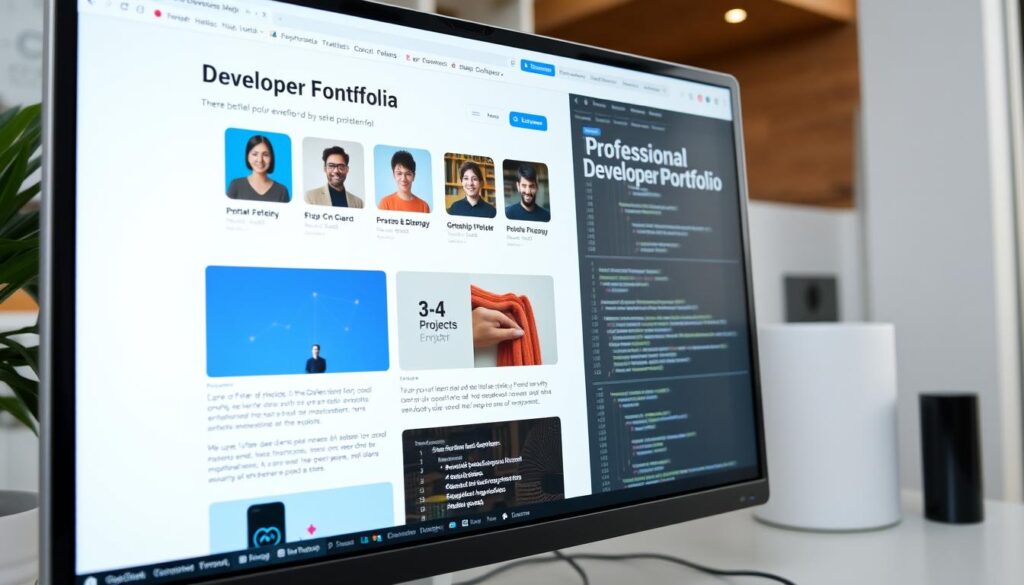Wondering if you can break into the lucrative world of software development without spending years and thousands of dollars on a computer science degree? The answer is a resounding yes. In fact, over 25% of professional software engineers don’t have a traditional degree. Companies like Google, Apple, and IBM have dropped degree requirements for many technical roles, focusing instead on skills and real-world experience.
This comprehensive guide will walk you through proven, actionable steps to become a software developer without formal education. Whether you’re considering a career change, looking to avoid student debt, or simply learn in a way that works better for you, you’ll discover exactly what employers are looking for and how to position yourself for success in the tech industry.
Key Takeaways
- A degree is no longer a requirement for high-paying software development jobs—companies increasingly value practical skills over formal education
- Building a strong portfolio of projects is more important than credentials for demonstrating your abilities to potential employers
- Strategic networking, targeted skill development, and interview preparation are crucial for breaking into the industry without traditional qualifications
Why a Degree Isn’t Mandatory for Software Development
Many successful developers have built careers without traditional degrees
The tech industry has undergone a significant shift in hiring practices. While degrees were once considered essential, employers now recognize that practical coding skills and problem-solving abilities often matter more than formal education. Here’s why:
Traditional Education Limitations
- Computer science curricula often lag behind rapidly evolving industry practices
- Theoretical knowledge doesn’t always translate to practical development skills
- Four-year programs require significant time and financial investment
What Employers Actually Value
- Demonstrated ability to write clean, efficient code
- Problem-solving skills and logical thinking
- Experience with current tools, frameworks, and development practices
- Completed projects that showcase real-world application
According to a Stack Overflow developer survey, nearly 70% of professional developers consider themselves at least partially self-taught. Companies like Google, Apple, IBM, and Tesla have all publicly stated that they no longer require degrees for many technical positions. What matters most is your ability to demonstrate practical skills through projects, contributions, and technical assessments.
Start Your Developer Journey Today
Download our free roadmap for self-taught developers and discover the exact skills, tools, and projects that will make you job-ready in months, not years.
5 Steps to Break Into Software Development Without a Degree
Becoming a software developer without formal education requires a strategic approach. Follow these five proven steps to build your skills, create a compelling portfolio, and land your first development job.
Step 1: Master Core Programming Skills

Start by building a solid foundation in programming fundamentals. Focus on these essential skills that employers consistently look for:
Programming Languages
- JavaScript – Essential for web development
- Python – Versatile language with simple syntax
- SQL – Critical for database interactions
- HTML/CSS – Fundamental for front-end work
Development Tools
- Git & GitHub – Version control essentials
- VS Code – Popular code editor
- Command Line – Basic terminal operations
- Docker – Container technology
Concepts & Methodologies
- Data Structures & Algorithms
- Object-Oriented Programming
- API Development & Integration
- Testing & Debugging
Don’t try to learn everything at once. Start with one language (JavaScript or Python are excellent first choices) and build from there. Focus on understanding core programming concepts rather than memorizing syntax. Practice writing code daily, even if it’s just for 30 minutes.
Step 2: Build a Portfolio That Showcases Your Skills

Your portfolio is your most powerful tool for demonstrating your abilities to potential employers. It serves as tangible proof of your skills in the absence of a degree. Here’s how to build an impressive portfolio:
Project Types to Include:
- Personal Projects – Applications that solve real problems or showcase specific skills
- Clone Projects – Recreations of popular websites or apps to demonstrate technical proficiency
- Open Source Contributions – Fixes or features added to existing projects
- Hackathon Projects – Collaborative work under time constraints
Portfolio Best Practices:
- Include detailed README files explaining project purpose, technologies used, and your role
- Ensure code is clean, well-commented, and follows best practices
- Create a professional GitHub profile with consistent contributions
- Build a simple portfolio website showcasing your projects and skills
- Include both complete applications and smaller components demonstrating specific skills
Quality matters more than quantity. Three well-executed, thoroughly documented projects are more impressive than a dozen half-finished ones. Focus on projects that demonstrate your ability to solve real-world problems.
Step 3: Learn Through Free and Low-Cost Resources

One of the greatest advantages of pursuing software development today is the abundance of high-quality, affordable learning resources. Here are some of the best options:
| Resource Type | Recommended Options | Best For |
| Interactive Platforms | freeCodeCamp, Codecademy, The Odin Project | Structured learning with hands-on practice |
| Video Courses | YouTube tutorials, Udemy, Coursera | Visual learners who prefer guided instruction |
| Documentation | MDN Web Docs, W3Schools, language documentation | In-depth understanding of specific technologies |
| Coding Challenges | LeetCode, HackerRank, CodeWars | Problem-solving skills and interview preparation |
| Books | “Eloquent JavaScript,” “Clean Code,” “Python Crash Course” | Comprehensive understanding of concepts |
Create a structured learning plan combining these resources. For example, use freeCodeCamp for foundational skills, supplement with YouTube tutorials for specific technologies, practice with coding challenges, and join Discord communities for support.
Need Personalized Guidance?
Book a 1:1 career strategy session with an industry expert who has helped hundreds of self-taught developers land their first tech jobs.
Step 4: Gain Practical Experience

Theoretical knowledge alone isn’t enough. You need practical experience to truly understand development workflows and collaborate effectively. Here are ways to gain experience without a traditional job:
Effective Ways to Gain Experience:
- Contribute to Open Source – Start with beginner-friendly issues on GitHub
- Volunteer Development – Build websites or apps for non-profits or local businesses
- Hackathons – Join weekend coding competitions to build projects under deadlines
- Freelancing – Take on small projects on platforms like Upwork or Fiverr
- Personal Projects – Build applications that solve real problems you encounter
Each of these experiences provides valuable lessons in project management, collaboration, and problem-solving that you can discuss in interviews. They also help you build a network of contacts who can provide references or job leads.
Step 5: Prepare for the Job Search and Interviews

The final step is preparing for and executing an effective job search. This requires both technical preparation and strategic networking:
Technical Interview Preparation
- Practice coding challenges on LeetCode or HackerRank
- Study common data structures and algorithms
- Prepare to explain your projects in technical detail
- Practice whiteboarding and problem-solving out loud
- Complete mock technical interviews with peers
Job Search Strategy
- Optimize your LinkedIn profile with relevant keywords
- Network with developers through meetups and online communities
- Target smaller companies and startups initially
- Consider internships or apprenticeships as entry points
- Prepare to explain your non-traditional background as a strength
When interviewing, be prepared to address your lack of a degree directly. Emphasize your practical skills, portfolio projects, and commitment to continuous learning. Many employers appreciate the self-motivation and determination required to learn programming without formal education.
Overcoming Common Roadblocks

The path to becoming a self-taught developer isn’t without challenges. Here are common roadblocks and proven strategies to overcome them:
Challenge: Information Overload
With countless languages, frameworks, and learning resources available, many beginners feel overwhelmed and unsure where to start.
Solution:
- Start with one language and master the fundamentals
- Follow a structured curriculum like freeCodeCamp or The Odin Project
- Focus on building projects rather than collecting certificates
- Join communities where you can get guidance from experienced developers
Challenge: Imposter Syndrome
Feeling like you don’t belong or aren’t qualified enough is common, especially without formal credentials.
Solution:
- Document your progress to see how far you’ve come
- Build projects that prove your abilities to yourself and others
- Connect with other self-taught developers who have succeeded
- Remember that even experienced developers constantly learn new skills
Challenge: Job Search Rejection
Facing rejection, especially from companies that filter for degrees, can be discouraging.
Solution:
- Target companies known to hire based on skills rather than credentials
- Use personal connections and referrals to bypass automated filters
- Consider contract-to-hire positions as entry points
- Treat each interview as a learning experience to improve
Challenge: Maintaining Motivation
Self-directed learning requires significant discipline and can lead to burnout.
Solution:
- Set small, achievable goals rather than focusing only on the end result
- Find an accountability partner or study group
- Build projects you’re personally interested in
- Take breaks and celebrate small wins along the way
Remember that every successful self-taught developer has faced these challenges. Persistence and adaptability are key traits that will serve you well both during your learning journey and throughout your development career.
Many successful developers started their careers without formal degrees
Career Paths and Specializations
Software development offers numerous specialization options, each with its own skill requirements and career trajectories. Here are some popular paths that are accessible to self-taught developers:
Front-End Development
Focus on creating user interfaces and experiences for websites and applications.
Key Skills:
- HTML, CSS, JavaScript
- React, Vue, or Angular
- Responsive design
- UI/UX principles
Entry Difficulty: Lower barrier to entry for self-taught developers
Back-End Development
Build server-side logic, databases, and application architecture.
Key Skills:
- Node.js, Python, or Java
- Databases (SQL, MongoDB)
- API development
- Server management
Entry Difficulty: Moderate, requires stronger CS fundamentals
Mobile Development
Create applications for iOS, Android, or cross-platform.
Key Skills:
- Swift or Kotlin
- React Native or Flutter
- Mobile UI design
- App store deployment
Entry Difficulty: Moderate, good option for focused learning
For self-taught developers, front-end development often provides the most accessible entry point, as results are visually apparent and the learning curve is more gradual. However, choose a specialization that aligns with your interests and strengths rather than just ease of entry.
Frequently Asked Questions
Can I really get hired as a software developer without a degree?
Yes, absolutely. According to Stack Overflow’s developer survey, over 25% of professional developers don’t have a related degree. Companies like Google, Apple, IBM, and Tesla have all publicly stated they no longer require degrees for many technical positions. What matters most is demonstrating your skills through a strong portfolio, technical interviews, and relevant experience.
How long does it take to become job-ready without a degree?
The timeline varies based on your prior experience, learning pace, and time commitment. On average, dedicated learners can become job-ready in 6-12 months of consistent study and practice. Some may take longer, while others with related experience might transition more quickly. Focus on building projects and practical skills rather than racing to meet an arbitrary deadline.
Should I attend a coding bootcamp instead of self-teaching?
Bootcamps offer structure, mentorship, and networking opportunities that can accelerate your learning. However, they typically cost ,000-,000 and require full-time commitment for 3-6 months. Self-teaching is more flexible and affordable but requires greater discipline. Consider your learning style, financial situation, and timeline when deciding between these options.
What programming language should I learn first?
For beginners, Python and JavaScript are excellent first languages. Python offers clean syntax and versatility across web development, data science, and automation. JavaScript is essential for web development and runs everywhere. Choose based on your interests: JavaScript for web development, Python for broader applications including data science, or Java/C# for enterprise software.
How do I explain my lack of a degree in job interviews?
Frame your self-taught journey as a strength, emphasizing your self-motivation, problem-solving abilities, and commitment to continuous learning. Prepare specific examples of how you’ve overcome challenges in your learning journey. Let your portfolio and technical skills speak for themselves, and be ready to discuss your projects in detail. Many employers value the determination and practical focus that self-taught developers bring to their teams.

Success Stories: Developers Who Made It Without Degrees
David Karp
Dropped out of high school at 15, taught himself to code, and founded Tumblr at age 21. The platform was later acquired by Yahoo for $1.1 billion.
“If you want to start something, just start it. Don’t wait for the perfect moment.”
Margaret Hamilton
With a mathematics degree but no formal computer science education, she taught herself programming and led the team that wrote the onboard flight software for NASA’s Apollo missions.
“There was no choice but to be pioneers.”
Jack Dorsey
Dropped out of college, learned programming through self-study, and went on to co-found Twitter and Square (now Block), becoming one of tech’s most influential figures.
“Make every detail perfect and limit the number of details to perfect.”
These stories highlight that success in software development depends more on skills, determination, and creative problem-solving than formal credentials. While their paths weren’t always easy, these self-taught developers leveraged their passion and practical knowledge to make significant contributions to technology.
Join Our Community of Self-Taught Developers
Connect with 10,000+ developers who’ve successfully broken into tech without traditional degrees. Get support, advice, and job opportunities from people who’ve been exactly where you are.
Conclusion: Your Path Forward
Becoming a software developer without a degree is not only possible—it’s a path that thousands have successfully traveled before you. The tech industry continues to evolve toward skills-based hiring, creating unprecedented opportunities for self-taught developers who can demonstrate their abilities through projects and practical knowledge.
Remember that your journey won’t be linear, and persistence is key. Embrace the challenges as learning opportunities, build a supportive network, and focus on creating projects that showcase your growing skills. With dedication and the right approach, you can build a rewarding career in software development regardless of your educational background.
The most important step is simply to begin. Start learning, start building, and start connecting with the community today. Your future in software development awaits.
